C. E. Vandever, U.S. Indian Agent for the Navajo Agency, responds to an Office of Indian Affairs letter that it will be difficult to obtain students from the Navajo Agency for off reservation boarding schools. Vandever cites the fact that four former students died shortly after returning from Carlisle, including two sons of popular chief…
Factors Affecting Student Recruitment
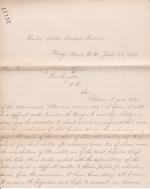
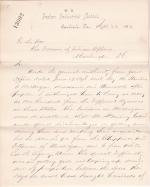
Richard Henry Pratt forwards a report from Alfred John Standing regarding his trip to Michigan and Minnesota to recruit students for the Carlisle Indian School. Pratt details the obstacles Standing experienced including maintaining a relatively equal gender ratio and the decentralized nature of the various communities and poor prior experiences…
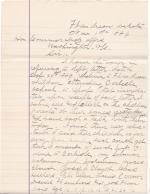
Charles Hill, U.S. Indian Agent for the Flandreau Agency, reports that in response to an Office of Indian Affairs letter, he went to the homes of children to discuss with parents sending the children to Carlisle. He notes that in most cases parents were hesitant to send their children so far away, and as a result he was only able to get ten…
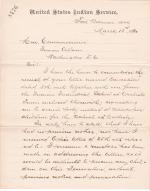
Archer O. Simons, U.S. Indian Agent for the Fort Belknap Agency, responds to the Office of Indian Service regarding sending students from the agency to the Carlisle Indian School. Simons notes that he never received the first letter asking him to send 25 students and indicates that a mistake has likely been made as it would be difficult to…
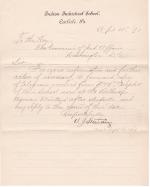
Alfred John Standing submits telegraph correspondence between himself and William P. Campbell regarding a request to have head men from the Fort Belknap Agency go East with a party as it would aid in recruiting students for Carlisle.
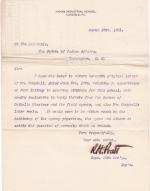
Correspondence regarding difficulties of William P. Campbell in recruiting students for the Carlisle Indian School at the Fort Belknap Agency.
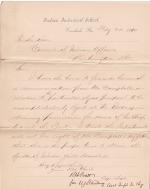
Alfred John Standing forwards a letter from William P. Campbell regarding a request to have a party of chiefs from the Fort Belknap Agency visit the East with a group of incoming Carlisle students. Campbell in particular notes that this would secure a good party of girls due to the perception of girls at the agency.
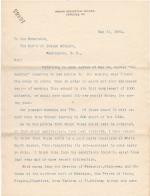
Alfred John Standing responds to an Office of Indian Affairs letter regarding a plan to increase enrollment at the Carlisle Indian School from 778 students at present to 1000 at the beginning of the next year, after 75 students return home. Standing provides information on which agencies can send students to Carlisle as well as how students…
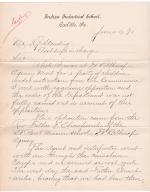
William P. Campbell details to Alfred J. Standing his difficulties in recruiting students from the Fort Belknap Agency; the letter was then forwarded to the Office of Indian Affairs. Campbell describes the actions taken by the head of the mission school, Father F. Eberschweiler, against the Carlisle Indian School making it difficult to secure…
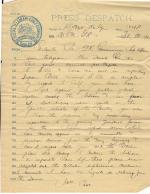
Richard Henry Pratt informs the Office of Indian Affairs that he has received their telegram regarding the Senate Committee cutting annual per capita appropriation to $150. Pratt notes that this is ample and further reiterates his beliefs in opposing the establishment of a public school system on the Indian Reservations. Pratt then goes into…
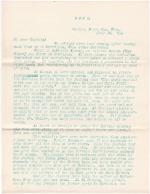
Richard Henry Pratt writes to the Office of Indian Affairs on a number of matters including the continued employment of Alfred John Standing, revisions to the Civil Service Code, and enrolling Dennison Wheelock at Dickinson College. In addition, Pratt forwards a letter of William P. Campbell regarding a recruitment trip among the Oneidas…
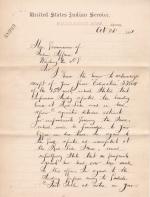
B. P. Shuler, U.S. Indian Agent for the White Earth Agency, provides a report to the Commissioner of Indian Affairs including on pupils sent to Fort Totten and a delegation to be sent Carlisle. Shuler states that all of the students sent to Fort Totten had the permission of their parents and the only complaint was by a teacher at the Rice River…
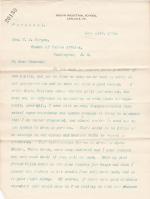
Richard Henry Pratt informs Thomas J. Morgan that the Carlisle Indian School has enough students to carry out its appropriation but could enroll additional students. He further states that the school has more success when an employee recruits the students rather than having the students recommended by the agencies.
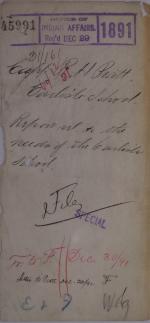
Richard Henry Pratt provides a report responding to questions from the Office of Indian Affairs on the needs of the Carlisle Indian School. Included are discussions on the need for more land, additional educational needs, and industrial training including the limitations of the industrial instruction received at Carlisle.
Pratt also…
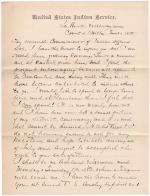
T. S. Ansley writes to Thomas J. Morgan that he has arrived at the La Pointe Agency and that a number of Carlisle students are from that agency. As the students seem contented and doing well, and writing home in ways to induce others to attend Carlisle.
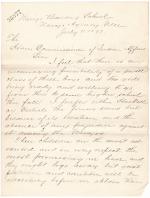
G. H. Wadleigh, Superintendent of the Navajo Boarding School, informs the Office of Indian Affairs that a small party of students would be interested in transferring to either Haskell or Carlisle. Wadleigh indicates Haskell would be better because of its location and lack of prejudice against it among the Navajo. He further states that it will…
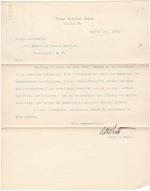
Richard Henry Pratt notes in response to an inquiry from the Office of Indian Affairs that he received intimations not to go into certain districts for students, and so he abandoned his recruiting trip. As a result he paid for his trip to and from Denver, Colorado himself.
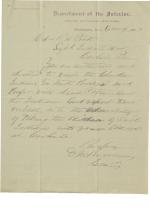
Commissioner of Indian Affairs Daniel M. Browning writes to Richard Henry Pratt authorizing him to inspect the Cherokee in North Carolina along with Agent Potter, and provide a verbal report to him about the possibility of enrolling Cherokee children at Carlisle.
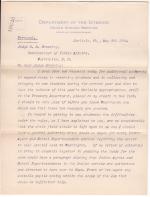
Richard Henry Pratt requests from Daniel M. Browning the authority to spend additional money in returning students and special authority in recruiting students. He includes a suggested document to meet his requirements.
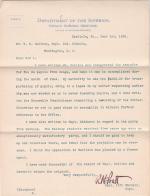
Richard Henry Pratt informs W. N. Hailmann regarding the transfer of 34 students from the Osage Agency to Carlisle and another party of students from the Ft. Belknap Agency.
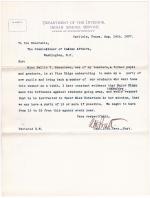
Richard Henry Pratt requests the Office of Indian Affairs instruct the U.S. Indian Agent at the Pine Ridge Agency assist Nellie Robertson in bringing a party of students from the agency to Carlisle.
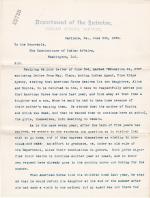
Richard Henry Pratt responds to the request to return Alice and Sophia American Horse.
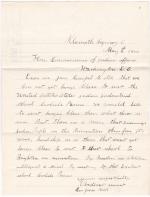
Jesse Kirk informs the Office of Indian Affairs that the Klamath Agency is having difficulty sending a large class of students to the Carlisle Indian School.
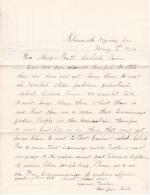
Richard Henry Pratt writes to the Office of Indian Affairs regarding obtaining students from the Klamath Agency. He further encloses a letter from the Rev. Jesse Kirk regarding opposition among certain members of the agency and suggests the agent write to them telling them to desist from their actions.
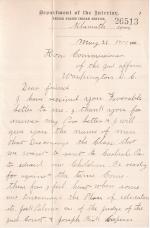
Rev. Jesse Kirk provides information related to difficulties in sending students from the Klamath Agency to the Carlisle Indian School.
